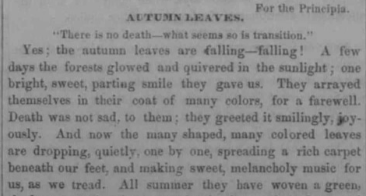“There is no death – what seems so is transition.”
Lavinia Goodell, quoting Henry Wadsworth Longfellow, November 1861
At this time of year, those of us who live in the northern states become keenly aware that summer is over. Leisurely drives to observe the fall colors are a favored pastime for many.

Lavinia Goodell, too, was a fan of autumn. The Goodell family’s correspondence in the 1860s and 1870s often contained some comment about the weather, and Lavinia’s letters made clear that she enjoyed the season. While she was still living in New York, Lavinia wrote to her parents, “It was a glorious day. It is quite cool and delicious autumn weather now, and I never felt better. “ After travelling by train from Pecatonica, Illinois to Janesville, Wisconsin after visiting her sister in 1873, she reported, “I think I never saw such fine autumn scenery.”
A decade earlier, twenty-two year old Lavinia had written a short piece titled “Autumn Leaves” for the Principia, her father’s anti-slavery newspaper. She began by quoting Longfellow, “There is no death – what seems so is transition.”

In the piece, Lavinia noted that while during the summer the trees “have clothed rugged trunks” and “have whispered sweet poetry in our hearts,” “now, in death, they throw themselves, a gorgeous golden offering at our feet.” But then she queried, “Dead? Shall we call them dead? No: within the bare, rugged trunk is still the principle of life…. When the spring-time comes, Nature, dear old mother Nature, will stand smiling and singing before us, as fresh, and young, and beautiful as on the morning of creation.” She concluded:
Winter comes to the heart, sometimes. The glad, beautiful summer of life is all gone…. The soul is shut up closely within itself. No warm sympathies, no loving caresses from the outer world waken into existence its buds and blossoms. Only the cold snow comes with icy touch, in answer to its wild heart cravings. Yet, deeply rooted in the great Source of Life and Love, it still lives…. Learn, O soul, a lesson from our glorious mother Nature! Like her thou too shalt “flourish in immortal youth.” Be patient! Thy spring-time cometh!
Read the entire piece here.
Sources consulted: “Autumn Leaves,” by Lavinia Goodell, published in the Principia November 9, 1861; Lavinia Goodell’s letter to Maria Frost (October 18, 1871); Lavinia Goodell’s letter to William and Clarissa Goodell (September 12, 1870).







